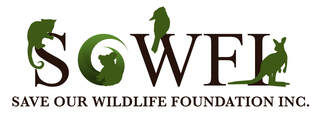What are the benefits of wildlife rehabilitation?
Some critics will say there is no benefit to saving individual animals. We say, there are plenty...
In our state of South Australia, the brushtail possum is listed as "rare" because it's lost 80% of its habitat since European settlement. Ringtail possums remain "common across its range", however that "range" is forever reducing with higher density living and new housing developments reducing back yards and fragmenting habitat. Bushfire can have a devastating impact in a very short space of time and small creatures like possums, birds, bats, bandicoots etc, rarely survive. Without the funds to survey, we can't be sure how populations are going but I think we can safely assume they are on the decline.
If you believe in the work of our wildlife rehabilitators and would like to help please contact us or donate to fund research.
- Rehabilitators often provide critical education to key stakeholders and communities, which can help reduce human-wildlife conflicts and accidents
- Rehabilitators provide valuable assistance and advice to growing numbers of people who value wildlife and make personal efforts to help wild animals in need. This evokes a sense of responsibility and sustainability in the populace.
- Wildlife rehabilitation allows people to relieve the suffering of injured and sick wild animals, and release them back into the wild where possible, to mitigate some of the impacts of human activity on their population
- Having wildlife rehabilitators who work with more common species, ensures that we have experienced people during natural disasters who are well-equipped to save wildlife and, in the process, help the South Australian community better prepare for the impacts of climate change.
- Rehabilitators provide a resource (time and expenses) to meet demand that the state government may be unable to promptly respond to due to limited resources (or may otherwise overlook due to other pressures and priorities).
- Rehabilitators are uniquely positioned to monitor and report on changes to populations, thereby assisting with policy and urban planning considerations.
- Rehabilitators help people connect with individual animals, which expands their sense of connection and stewardship of the natural world. Psychological research has found this to have a positive effect on well-being and mood, thereby promoting mental health - something more important now than ever given the unfortunately increasing rate of mental illness in the community.
In our state of South Australia, the brushtail possum is listed as "rare" because it's lost 80% of its habitat since European settlement. Ringtail possums remain "common across its range", however that "range" is forever reducing with higher density living and new housing developments reducing back yards and fragmenting habitat. Bushfire can have a devastating impact in a very short space of time and small creatures like possums, birds, bats, bandicoots etc, rarely survive. Without the funds to survey, we can't be sure how populations are going but I think we can safely assume they are on the decline.
If you believe in the work of our wildlife rehabilitators and would like to help please contact us or donate to fund research.









